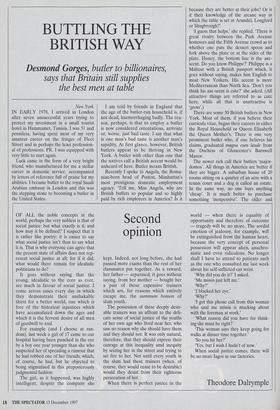Second opinion
OF ALL the noble concepts in the world, perhaps the very noblest is that of social justice: but what exactly is it, and how may it be defined? I suspect that it is rather like poetry: it is easier to say what social justice isn't than to say what it is. That is why everyone can agree that the present state of affairs does not rep- resent social justice at all; for if it did, what would there remain for idealistic politicians to do?
It goes without saying that the young, idealistic to the core as ever, are much in favour of social justice. I come across cases every day in which they demonstrate their unshakable thirst for a better world, one which is free of the historical injustices which have accumulated down the ages and which it is the fervent desire of all men of goodwill to end.
For example (and I choose at ran- dom), last week a girl of 17 came to our hospital having been punched in the eye by a boy one year younger than she who suspected her of spreading a rumour that he had robbed one of her friends; which, of course, he had, but he objected to being stigmatised in this preposterously judgmental fashion.
The girl, as it happened, was highly intelligent, despite the company she kept. Indeed, not long before, she had passed more exams than the rest of her classmates put together. As a reward, her father — separated, it goes without saying, from her mother — bought her a pair of those expensive trainers which are, for reasons which entirely escape me, the summum bonum of slum youth.
The possession of these deeply desir- able trainers was an affront to the deli- cate sense of social justice of the youths of her own age who lived near her, who saw no reason why she should have them and they should not. It was only natural, therefore, that they should express their outrage at this inequality amd inequity by seizing her in the street and trying to set fire to her. Not until every youth in the slum had these trainers (when, of course, they would cease to be desirable) would they desist from their righteous persecution of her.
When there is perfect justice in the world — when there is equality of opportunity and therefore of outcome — tragedy will be no more. The sordid emotion of jealousy, for example, will be extinguished from the human heart, because the very concept of personal possession will appear alien, anachro- nistic and even ridiculous. No longer shall I have to attend to patients such as the one who consulted me last week about his self-inflicted cut wrist.
'Why did you do it?' I asked.
'Me missis just left me.'
'Why?'
'I blacked her eye.'
'Why?'
'I got this phone call from this woman who said me missis is mucking about with the foreman at work.'
'What reason did you have for think- ing she must be right?'
'This woman says they keep going for walks at dinner time together.'
'So you hit her?'
'Yes, but I wish I hadn't of now.' When social justice comes, there will be no more Iagos in our factories.
Theodore Dalrymple


















































































 Previous page
Previous page